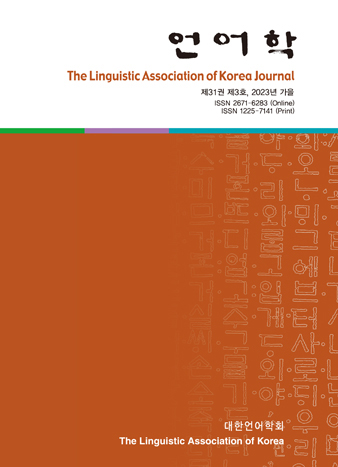대한언어학회 전자저널

-
온라인 수업에서 상호작용 교수설계가 학습몰입과 학습지속의향에 미치는 영향: N대학 교양영어 수업의 사례를 중심으로
-
The Internal Structure of Reflexives and a NP-internal Movement Analysis
-
Chinese Undergraduate Students’ Motivation to Learn L2 English and L3 Korean Simultaneously
-
What Restricts or Boosts the Use of Internally-Headed Relative Clauses in Korean?
-
English Wh-Question Formation by Korean Elementary and Middle School EFL Students
-
Korean ESL Learners’ Individual Differences in Intercultural Sensitivity and Language Development
31권 3호 (2023년 9월)
- The Internal Structure of Reflexives and a NP-internal Movement Analysis
-
Hyosik Kim
Pages : 51-68
Abstract
Keywords
# reflexives # possessive phrase # genitive # case drop # Across-The-Board (ATB) movement # coordination
References
- Ahn, B., & Kalin, L. (2018). What’s in a (English) reflexive. In Proceedings of the 48th annual meeting of the North East Linguistics Society, 1, 1-13.
- An, D. H. (2009). A note on genitive drop in Korean. Nanzan Linguistics, 5, 1-16.
- An, D . H. (2014). Genitive case in Korean and its implications for noun phrase structure. Journal of East Asian Linguistics. 23, 361-392.
- Bak, J. S. (2006). On the optionality of the genitive Case marker uy. Studies in Generative Grammar. 16, 3-18.
- Choi, K. Y. (2009). Hankwuke kyekkwa cosauy sayngsengthongsalon. A generative grammatical analysis of Case and nominal suffixes in Korean. Seoul: Hankuk Mwunhwasa.
- Chomsky, N. (1980). On binding. Linguistic Inquiry, 11, 1–46.
- Chomsky, N. (1981). Lectures on government and binding, foris, dordrecht. Lectures on Government and Binding 1981.
- Chomsky, N. (1986). Knowledge of language: Its nature, origin, and use. New York: Praeger.
- Collins, C. (2007). Home sweet home. NYU working papers in linguistics. 1, 1-34.
- Collins, C. (2019). The Internal Structure of Reflexive Pronouns. Retrieved April 20, 2019, from http://ordinaryworkinggrammarian.blogspot.com/2019/04/the-internal-str ucture-of-reflexive.html
- Helke, M. (1973). On Reflexives in English. Linguistics. 11, 5-23.
- Kang, Y. S. (1986). Korean syntax and universal grammar. Ph.D. Dissertation, Harvard University.
- Lees, R. B., and Klima, E. S. (1963). Rules for English Pronominalization. Language, 39(1), 17-29.
- Postal, P., Reibel, D. A., & Schane, S. A. (1969). On so-called pronouns in English. Readings in English Transformational Grammar, 5, 12-25.
- Ross, J. (1967). Constraints on variables in syntax. Phd thesis, Massachusetts Institute of Technology.
- Williams, E. (1978). Across-the-board rule application. Linguistic Inquiry, 9(1), 31–43, 16.